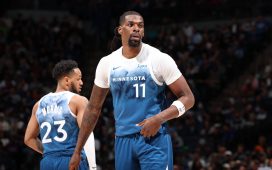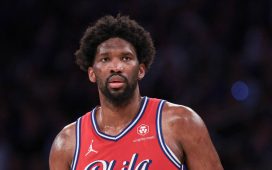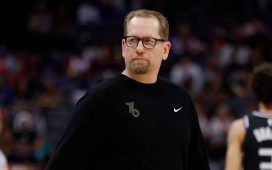Old is age 30 in the sports world. That’s about when a certain orneriness seeps into the star athlete’s demeanor. They are lightly weathered, having put up with enough teammates they didn’t care for, fielded too many stupid questions from the press. My theory is that they have started to get sick of basketball too — not the game itself, but how much work it requires, the restrictions it places on their lives, the tedium of lifting weights and shooting a million jumpers a day. Am I just going to keep doing this forever? Everyone has moments when they wish they could be something else, daydreaming about heading an architecture firm, trout fishing in Montana, measuring the distance between themselves and that idyll. If you’ve spent the past decade living in the gym and in the chyrons of tetchy debate shows, the distance must seem intergalactic.
LeBron James has been annoyed, pretty much nonstop, since turning 30 upon returning to Cleveland in 2014. He’s been annoyed with Kyrie Irving’s solipsism, Kevin Love’s faintness of heart, the media’s crush on Steph Curry, Kevin Durant joining the Warriors, the “shut up and dribble” crowd, the “Kawhi is better than LeBron” narrative, Giannis’ MVP, the Clippers’ title hype. Some of this has made sense, some of it a product of his outsize entitlement, some of it uncut MJ-style grievance-hunting, but it’s all legible enough, because it must be annoying — if tremendously fun, almost supernatural — to be LeBron James. Any day he rolls out of bed in a bad mood, he’s got a decent reason. (The opposite also being true.) He wins his fourth title, in yet another Finals MVP-winning performance, and says he wants his damn respect. It’s histrionic; he gets plenty. But he’s not talking about other people as much as his own inner restlessness: There is no amount of praise that will feel commensurate with the amount of work he’s put in.
Which isn’t to say he’s dissatisfied. He thinks he’s the best to ever do it, and unlike every basketball player other than Michael Jordan, there’s a strong possibility he’s right about that. But there’s not much left for LeBron to discover, about himself or the game. He is strictly proving stuff, at this point. I can win four titles; I can win five. I can be great at 35; I can be great at 36. Practically nobody gets to this stage of their NBA career, where they’ve done it all, and the challenge is maintaining their level rather than achieving a new one. LeBron, Jordan, Kareem and maybe one or two other players in the game’s history, remind us that basketball, as a craft, is more constricting than most. Filmmakers can travel across genres; chefs can study new cuisines. The only truly fresh possibilities left for LeBron will be created by creeping limitations. What will he be able to do as his body deteriorates? This was an interesting question when posed to Vince Carter, but LeBron’s entire career, even before he won titles, has in some way been about supremacy. He operates — exclusively, up till now — at the grandest scale. Putting up 15 and 9 at age 40 would be a cool accomplishment, but it’s not exactly Dylan going electric.
This risks overstating LeBron’s ennui. He’s clearly not cripplingly bored. Athletes tend to be process-oriented people, and no athlete is more invested in his process than LeBron. Coaches and teammates are often awestruck by how closely he watches his diet, his commitment to routine, the millions he spends on cutting-edge fitness technology and personal training. Jordan was motivated by a straightforward kind of competitiveness. He hated to lose, like all of us do, but he simply hated it more than anybody ever has, consumed by or at least always at the edge of some biblical anger, at the thought of someone getting one over on him. LeBron’s competitiveness is peculiar, at least for an athlete. It reminds me of Barack Obama’s indefatigable self-consciousness, where you are always, with every action, telling other people about yourself, and so living takes on a compositional quality. You’re writing your own biography in real time, and you want everything you do to be justifiable, correct. What reads as aloofness or paralysis — traits you wouldn’t ascribe to Jordan — is probably ill-timed contemplation. As if you’d like to tell an interviewer to pause the tape so that you can collect your thoughts.
LeBron is moved not only by an uncomplicated will to win, but this ever-developing sense of how what he’s doing now will be perceived years down the line. His social justice efforts, for instance, are highly commendable, but not without their calculated aspect. A more minor example: He buzzer-clutched at the end of the first quarter in Game 6 against Miami. Figured eh, we’re gonna win this one; no need to dent my shooting percentage. He’s savvy to the point of silliness, but for the same reasons he has an unparalleled discipline, which is why he’s the best player in the league while all his peers are either retired or thoroughly washed up. There is no such thing as total control in a team sport, or really any endeavor, but he leaves nothing that is within his power to chance.
In the end, all of LeBron’s complaining, the labor and the anxiety, vanity and ambition, boredom, uncertainty about the future — it doesn’t cohere or resolve itself, because it couldn’t possibly, but year after year, it contributes to deep playoff runs and even championships. It’s not a serene existence, but it is probably about as rewarding as work gets. For as long as it lasts, anyway. In LeBron’s case, it has already been a long time. There’s no reason, were it entirely up to him, that it shouldn’t continue.








